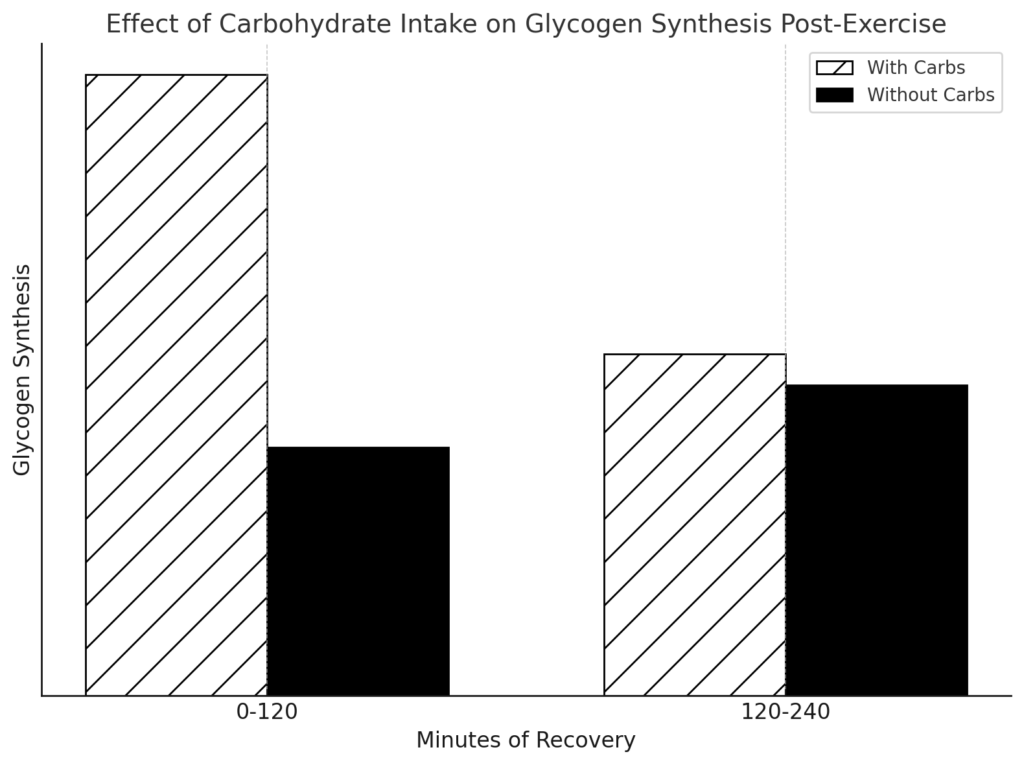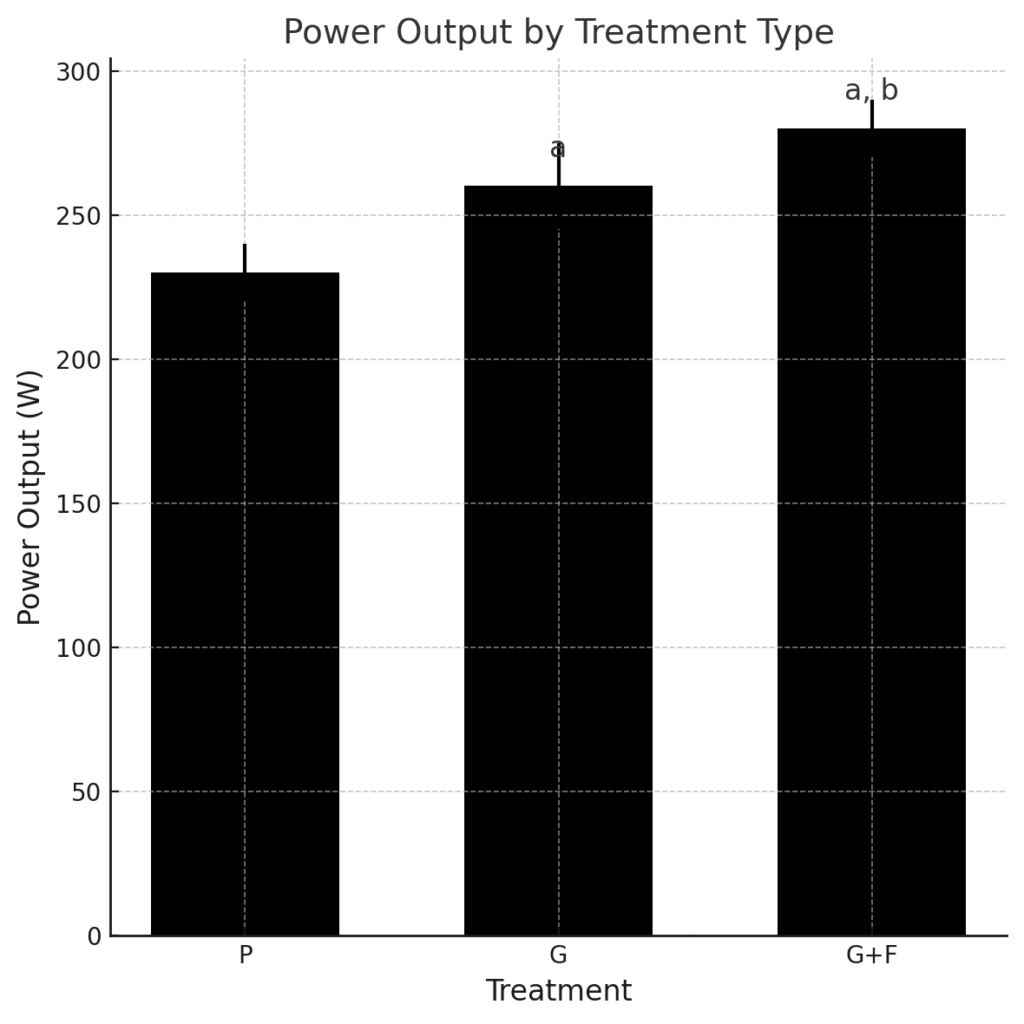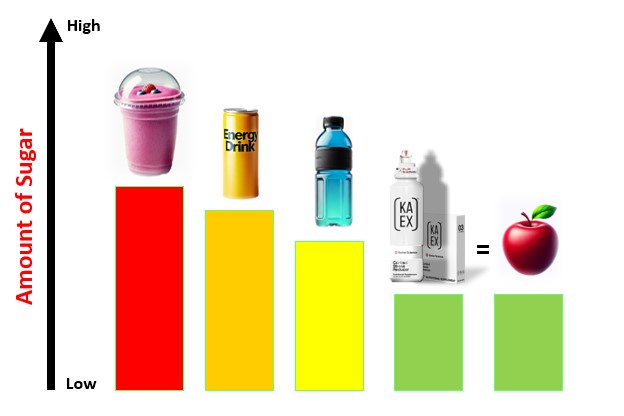Why Sugar-Free Recovery Drinks Are Useless
Sugars, a form of carbohydrates, are essential in sports recovery drink to optimize performance and recovery. Here’s why they are crucial:
1. Glycogen Replenishment
During a workout, your muscles deplete their glycogen stores, which are sugars stored in muscles for immediate energy. Consuming sugars after exercise is crucial to replenish these stores effectively, ensuring your muscles recover and are ready for the next workout. Studies show that glycogen synthesis is most efficient within the first 30–60 minutes after exercise¹. KA-EX should ideally be consumed within the first two hours post-workout, as glycogen synthesis decreases significantly after this window (as you can see on the figure² on the right). This timing maximizes recovery by inducing muscle readiness for the necessary recovery bioprocesses.

2. Improved Muscle Recovery
Proper recovery between workouts depends on your muscles efficiently absorbing the nutrients they need. Sugars play a vital role in this process by stimulating insulin release, which enhances nutrient uptake. Insulin improves recovery by activating sodium-glucose transporters in the intestines, aiding rehydration³. It also facilitates amino acid and glucose absorption into muscle cells for repair and growth while accelerating glycogen resynthesis to restore energy reserves⁴. Optimizing this comprehensive nutrient delivery system ensures your muscles recover quicker and better, thus maximizing training outcomes.

3. Enhanced Nutrient Absorption and Rehydration⁵ ⁶ ⁷
Carbohydrates are proven to be essential for effective rehydration. Drinks containing glucose and electrolytes, like KA-EX, outperform plain water in restoring fluid balance. They enhance fluid retention, minimize urinary losses, and improve sodium and water absorption in the intestines, which is critical for hydration. KA-EX combines glucose, electrolytes, amino acids, vitamins, and bioactive substances to optimize hydration and nutrient absorption, making it an all-in-one recovery solution.
4. Energy Provision⁸
The combination of glucose and fructose in KA-EX offers a rapid and efficient energy source. These sugars are quickly metabolized, which is essential for sustaining performance during activities lasting over an hour. Glucose provides immediate energy to fuel high-intensity activities, while fructose complements glucose by enhancing fluid absorption and nutrient uptake. This combination replenishes energy stores effectively, keeping you performing at your best.
Why KA-EX Has the Best Sugar Composition: Glucose + Fructose
KA-EX has the best sugar composition because it combines glucose and fructose for optimal recovery. Glucose, also known as dextrose, is ideal for muscle recovery because it can be absorbed directly without requiring digestion, rapidly restoring glycogen levels. Fructose, while less efficient for glycogen synthesis, complements glucose by improving fluid absorption and overall nutrient uptake. Research shows that combining glucose and fructose enhances performance, boosts fluid absorption, and ensures faster nutrient delivery to muscles.
As shown in the study⁹ on the right, it compared the effects of a water placebo (P), glucose (G), and a glucose-fructose mix (G+F). The G+F group achieved the highest power output, demonstrated better performance, and completed the trial faster than the other groups.

Additionally, KA-EX is calorie-conscious, containing just 85 kcal, roughly the same as an apple (see the comparison chart below). It provides essential sugars for recovery without adding unnecessary calories for taste. KA-EX is meticulously formulated to maximize training outcomes, enhance muscle recovery and endurance, and reduce muscle soreness (DOMS). Its precise sugar composition ensures optimal performance and recovery, making it the ultimate sports drink for athletes.

References
- Blom, P. C., Høstmark, A. T., Vaage, O., Kardel, K. R., & Maehlum, S. (1987). Effect of different post-exercise sugar diets on the rate of muscle glycogen synthesis. Medicine & Science in Sports & Exercise, 19(5), 491–496. https://doi.org/10.1249/00005768-198710000-00011
- Ivy, J. L., Katz, A. L., Cutler, C. L., Sherman, W. M., & Coyle, E. F. (1988). Muscle glycogen synthesis after exercise: Effect of time of carbohydrate ingestion. Journal of Applied Physiology, 64(4), 1480–1485.
- Wapnir, R. A., & Teichberg, S. (2002). Regulation mechanisms of intestinal secretion: Implications in nutrient absorption. The Journal of Nutritional Biochemistry, 13(4), 190–199. https://doi.org/10.1016/S0955-2863(02)00181-X
- Børsheim, E., Cree, M. G., Tipton, K. D., Elliott, T. A., Aarsland, A., & Wolfe, R. R. (2004). Effect of carbohydrate intake on net muscle protein synthesis during recovery from resistance exercise. Journal of Applied Physiology, 96(2), 674–678. https://doi.org/10.1152/japplphysiol.00333.2003
- Institute of Medicine (US) Food and Nutrition Board. Committee on Military Nutrition Research. (1994). Use of carbohydrate-electrolyte solutions for fluid replacement. In Activity Report. Washington, DC: National Academies Press. Retrieved from https://www.ncbi.nlm.nih.gov/books/NBK231364
- Murray, R. (1987). The effects of consuming carbohydrate-electrolyte beverages on gastric emptying and fluid absorption during and following exercise. Sports Medicine, 4(5), 322–351. https://doi.org/10.2165/00007256-198704050-00002
- Ganio, M. S., & Tucker, M. A. (2014). Sugar-sweetened beverages and hydration. In J. Rippe (Ed.), Fructose, high fructose corn syrup, sucrose and health (pp. 297–314). Humana Press. https://doi.org/10.1007/978-1-4899-8077-9_17
- Murray, R. (2014). Sugar, Sports Drinks, and Performance. In: Rippe, J. (eds) Fructose, High Fructose Corn Syrup, Sucrose and Health. Nutrition and Health. Humana Press, New York, NY. https://doi.org/10.1007/978-1-4899-8077-9_18
- Currell, K., & Jeukendrup, A. E. (2008). Superior endurance performance with ingestion of multiple transportable carbohydrates. Medicine & Science in Sports & Exercise, 40(2), 275–281. https://doi.org/10.1249/mss.0b013e31815adf19.
